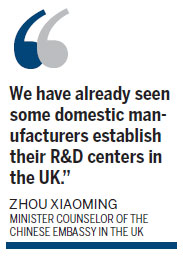China's investment in UK will be 'explosive'
Updated: 2013-01-04 07:56
By Ding Qingfen in London (China Daily)
|
|||||||||||
High-end products, infrastructure are targeted sectors, diplomat says
China's investment in the United Kingdom will continue its "explosive" growth, with high-end manufacturing and infrastructure leading the way, a senior diplomat predicted.
"The UK is the most open economy, and also the most market-oriented," in Europe, said Zhou Xiaoming, minister counselor of the Chinese embassy in the UK.
 |
In 2011, the UK was the third-largest EU destination for Chinese investment, following Luxembourg and France, according to the Ministry of Commerce.
China's overseas direct investment in the UK in 2011 was $2.5 billion, it said.
But Zhou said the real figure was far more as Chinese overall investment in the UK experienced "explosive" growth.
"It is estimated that the Chinese capital that flew into the country in 2011 reached $6.5 billion," said Zhou.
And the momentum will probably be sustained in the coming years, he said.
The past year also saw some key mergers and acquisitions.
In May, Shanghai-based food and beverage group Bright Food agreed to pay $1.7 billion, including debt, for a 60 percent stake in UK cereal maker Weetabix.
Reports in December said China Gas Holdings agreed to buy London-listed Fortune Oil's gas business in China for $400 million.
"Chinese capital mainly went to the service, energy, food and mining industries," said Zhou.
And "high-end manufacturing and infrastructure will be hot spots" for Chinese companies, he added.
Executives of China Investment Corp, a $410 billion sovereign wealth fund, have repeatedly said that the company will seek infrastructure deals in the UK.
They agreed to buy a 10 percent stake in Heathrow Airport in October.
This follows closely on the fund picking up a stake in Thames Water last year.
"We could say the UK is the most open market worldwide, especially in the infrastructure sector, and this means huge business for China," said Zhou.
From 2011 to 2015, the UK is expected to need capital worth about $325 billion for the infrastructure sector, he said.
As a country that is proud of innovation and design, the UK is a "good place" for Chinese manufacturers to set up research and design departments, Zhou said.
"We have already seen some domestic manufacturers establish their R&D centers in the UK," he said.
Last summer, the Chinese fashion brand Bosideng made its first foray abroad, opening a flagship store in London's West End. The company makes its products in the UK.
"The top brands in the world are in London and Bosideng is here to learn from them and to build itself into a luxury brand," said Zhu Wei, CEO of Bosideng Corp UK.
"We have got the best local designers to join us," he said.
"The UK is the land of thinkers. Chinese manufacturers could learn a lot when they are here," Zhou said.
To further boost investment, the UK is about to introduce Patent Box legislation.
This will come into effect in April 2013 and aims to encourage more companies to invest in patents, research and development through cutting taxes and providing incentives.
GDP growth in the UK in the third quarter was the strongest since the third quarter of 2007. But the Bank of England has said the fourth quarter is likely to see a contraction.
The UK suffered its second recession since the financial crisis between late 2011 and mid-2012.
Economists predict that a pickup in the economy is not likely in the immediate future.
Since the financial crisis, China's ODI has been on the rise and Europe has become an increasingly hot destination.
Since the beginning of 2011, China has conducted 32 mergers and acquisitions throughout Europe, valued at about $15 billion. The deals were mainly in the high-tech fields.
But Chinese proposals and investment deals have been frequently hindered by restrictions in some European nations.
The EU said last year it has been collecting evidence for a potential anti-dumping or anti-subsidy case against Huawei Technologies Co Ltd and ZTE Corp, the world's leading makers of wireless telecom equipment. This follows a report in the US that the companies were a potential security risk. This allegation was categorically rejected by both companies.
"Fortunately, the policy and regulations here are transparent and well made. More importantly, there are no investment restrictions in the majority of sectors except for military projects and the media industry," said Zhou.
dingqingfen@chinadaily.com.cn
Related Stories
UK's University of Birmingham sets up China Institute 2012-12-14 17:06
China to remain economic driving force - UK's ACCA 2012-12-06 22:01
Beijing: UK film showcase 2012-11-30 11:16
Chinese, UK scientists pioneer technique to predict ecosystem crises 2012-11-29 20:30
UK university targets Chinese students 2012-11-26 16:44
UK, China issue joint call on e-vehicle research 2012-11-23 16:48
Today's Top News
President Xi confident in recovery from quake
H7N9 update: 104 cases, 21 deaths
Telecom workers restore links
Coal mine blast kills 18 in Jilin
Intl scholarship puts China on the map
More bird flu patients discharged
Gold loses sheen, but still a safe bet
US 'turns blind eye to human rights'
Hot Topics
Lunar probe , China growth forecasts, Emission rules get tougher, China seen through 'colored lens', International board,
Editor's Picks

|

|

|

|

|

|





